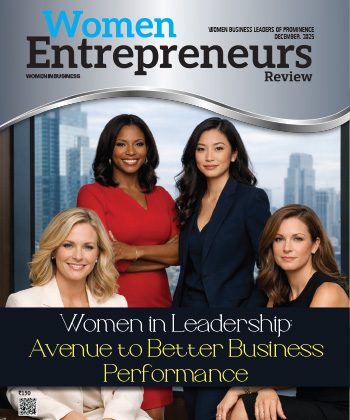
Uncovering the Various Facets of Serial Entrepreneur & Angel Investor Dr. Somdutta Singh
By: WE Staff | Wednesday, 28 December 2022
Entrepreneurship is often an uphill battle. It requires someone with immense talent, persistence and skill to become successful in the entrepreneurial world. However, there are few who crack the code and successfully turn into serial entrepreneurs.One such name is Dr. Somdutta Singh, a serial entrepreneur and angel investor.
Dr. Somdutta has previously led businesses that have been successfully acquired, including the AdTech startup Unspun Group and the crowdsourced fashion label IRA - House of Designers. Her current venture is Assiduus, an AI-powered cross-border E-commerce accelerator.
Owing to her experience and expertise, Dr Somdutta has received numerous awards and honours, has been named one of Fortune India's 50 Most Powerful Women, and is a proud member of the exclusive Forbes Business Council by invitation only. She was the first Indian woman to serve on the board of Philip Kotler's Kotler Impact and was the youngest and only female vice-chairperson of the NASSCOM Product Council. Dr.Somdutta is also a member of the Core Committee of WEP (Women Entrepreneurship Platform) by NITI Aayog.
The Women Entrepreneur team speaks to her about the various ventures Dr.Somdutta has been a part of and about her views on women in leadership. Here are choice excerpts from the conversation.
Give some an insight on your business endeavors.
My first company was Unspun Group, a market research leader and business-consulting firm intended to help clients generate leads. My second venture was a crowdsourced multimillion-dollar fashion label on Amazon and retail, IRA - House of Designers. Unspun Group and IRA have both been successfully acquired.
Assiduus Global is my third company, the world's fastest-growing AI-powered cross-border E-commerce accelerator. Assiduus helps D2C brands launch, scale and grow across global E-commerce marketplaces by enabling their digital commerce through end-to-end distribution and supply chain management.
What prompted you to begin making investments in startups around the world? What are your investing principles?
A strong, thoughtful, persuasive, and comprehensive business plan is what investors are most interested in seeing.
Three items I consider are:
1. Creating a portfolio of businesses is crucial when making deal-by-deal investments in startups. For a logical approach to portfolio diversity, it makes sense to invest in 5 to 10 startups. In a portfolio of 10 assets, the odds are that two to three will do exceptionally well, another two to three will break even, and the other two to three will fail.
2. Due in part to the fact that venture capital is categorised as an alternative investment and hence exhibits no association with traditional market movements, investing in VC can work as an excellent portfolio diversification technique. For investors looking to spread the risk carried within their portfolio, this can be very advantageous.
3. Venture capital, which builds on the idea of assisting game-changing firms, draws angel investors not only for the financial rewards but also for the opportunity to assist in realising the potential of numerous great businesses. Investors might possibly contribute their knowledge and skills with these businesses by supporting them, frequently from the idea stage onward, in an effort to increase their chances of success.
What specific initiatives or programmes have you funded with a focus on empowering youth with digital skills?
I run a not-for-profit organization by the name of Digital Leadership Institute (DLI) focused on making the youth of India digitally literate to help them lead self-sustainable lives. The shortage of digital skills in the current marketplace is unprecedented and needless to say the future has no place for the digitally illiterate.
DLI invests in the youth and empowers them with digital skills in an era that is technologically driven, so as to help them leverage technology in order to sustain innovation as well as deploy the knowledge to improve themselves and the economy of the country. India, or for that matter, any country can prosper only when it moves from a services-centric economy to a self-sustainable economy and this can be possible only when the youth are self-sustainable. At DLI, we collaborate with foreign Universities and curate curriculum that is made available to aspiring students and professionals across the globe.
What is your take on India’scurrent economic situation? Howdoes it affect women-owned businesses?
Failures do not exist; challenges do. We all experience moments of challenges and setbacks, but triumphs can only be experienced after overcoming some low moments.
Usually, when we talk about success in terms of how it’s defined and experienced by men versus how it is by women, we call out the differences, which tend to fall along stereotypical gender lines. I think that the best way to taste success is to surround yourself with them, people who are amazing at life and who will encourage you to be amazing at it, too!
My mantra - team building and tapping resources are definitive keys to running successful businesses rather than being a one-woman show.
There’s no escaping that India remains largely patriarchal. Women entrepreneurs are constantly battling male egos and mental barriers. The very idea of women going toe to toe with men may not always sit well. My motto here is - Don't get sucked into fighting the bias. Find your niches, set up a solid support system that works for you and let your work, rather than gender be the focal point.
What was your contribution to NITI Aayog’s visionary Women Entrepreneurship Platform (WEP), which has assisted thousands of women throughout India on their entrepreneurial journeys?
I am a member of the Core Committee of WEP (Women Entrepreneurship Platform) by NITI Aayog, to provide opportunities to women, to help them realise their entrepreneurial aspirations, scale-up innovative initiatives and chalk-out sustainable, long-term strategies for their businesses.
The Women Entrepreneurship Platform (WEP) aims to become an aggregation platform, to encourage women across diverse enterprise initiatives to come on-board, and thereby substantially increase the number of women entrepreneurs. The mission is to enable collaborations among peers, enablers, partners and industry professionals.
My not-for-profit organization, Digital Leadership Institute (DLI) provided free training to 1,000 women through the WEP platform in the areas of beauty and wellness, fashion, health, accounting and taxation, competitive strategy, patent and company registration, PR and communication and digital marketing. DLI collaborated with partners based in different cities to provide offline training and workshops, and the goal was to conduct at-least 12 workshops -- one offline workshop per month -- in different cities, especially in Tier II and Tier III cities.
What are your thoughts on the current state of women in leadership positions?
The pandemic's unprecedented challenges might have hindered our progress toward gender parity in leadership positions. But it also shifted focus on broader corporate responsibility, incorporating diversity, equity, and inclusion components into their entire objectives, plans, and policies.
a. Recruiting is not a passive activity or a technique for achieving greater gender diversity. A gender-balanced field of candidates should be a goal for leaders. They should seek to uncover and eliminate systematic prejudice in conventional hiring procedures at the organizational level.
b. Organizations are accountable for improving the opportunities and policies for women. However, in order to move forward and break free from the habits holding them back, women also require help.
When women hold leadership positions, they bring a unique set of abilities, creative viewpoints, and, most crucially, structural and cultural distinctions that motivate practical solutions. A new feeling of awareness will emerge as a result of bringing a creative viewpoint, helping to discover the subtler aspects that the unaided sight could miss.
What have been the most valuable lessons you’ve discovered along the way as an entrepreneur, and what is the best piece of advice you have ever received?
These are some of the most important lessons I have picked up throughout the years. You may learn something from everyone. Leaders have a variety of responsibilities. Being aware of one's own needs in terms of mental and physical welfare is essential.
This is more of a lesson than an advice. I have recognized how every adversity comes with an opportunity. In 2020, when the world was, and still is, grappling under the pandemic, we were all presented with an intensifying set of challenges. I had two options: give into the crisis or rise like a phoenix from the ashes. If I had to survive, I knew I had to drive through and that’s exactly what I did.
Most Viewed
- 1 Women's Health Startup HerMD Closing Doors Amid Industry Challenges
- 2 5 Famous Women in Indian Armed Forces
- 3 Saudi Women No longer Require Male Permission for Clothing Choices, says Prince MbS
- 4 Kolkata Medtech Startup Innovodigm Raises Rs 5.5 Crore Seed Funding Led by IAN Group
- 5 Yamunanagar's Kashish Kalra Honoured after Securing 111th Rank in UPSC Civil Services Exam
- 6 Madurai Appoints Its First Woman Corporation Head
- 7 IAS Vijayalakshmi Bidari Appointed as the new Nagpur Divisional Commissioner
- 8 American Entrepreneur Lucy Guo Overtakes T Swift to become Youngest Female Billionaire
- 9 ICC Women's World Cup 2025 Trophy Showcased at Indore's Holkar Stadium
- 10 Aparna Saxena's Beauty Venture AntiNorm Launches in India
- 11 Vidya Nataraj Co-Founded BlueStone Jewellery & Lifestyle files IPO
- 12 5 Women Freedom Fighters of India
- 13 Dr. G Krishnapriya appointed as CEO for Trichy
- 14 M3M & Sirona Partner to Introduce Menstrual Hygiene Vending Machines in 15 Locations
- 15 Punjab Govt launches SHE Cohort 3.0 Supporting Tech-led Women Startups
- 16 Indian origin Lawyer, Sweena Pannu appointed as the US New Superior Court Judge
- 17 The Aurora Tech Award recognizes 4 Indian Women-led Startups
- 18 Kerala's Republic Day parade featured an all-female tableau
- 19 Manisha Kabbur Becomes Karnataka's First Woman International Karate Coach
- 20 Director K. S. Ravikumar's Daughter Maalica Ravikumar Launches Life Coaching Company 'Evergrowth Academy' for Women
- 21 Leezu's Raises Pre-Seed Funding to Accelerate Growth in Sexual Wellness Industry
- 22 Sattu: Super-easy summer drink for PCOS gut healing
- 23 Swathi Nelabhatla creates Sitha App, India's First Women-Exclusive Gig Platform
- 24 7 Timeless Female Kathak Dancers & their Iconic Legacies
- 25 Meet 7 Iconic Women Architects of Modern India & their Most Impactful Work
- 26 This Woman-led Insuretech Startup is Helping Bridge the Education Financing Gap in India
- 27 Women Leaders Share Lessons Learnt from India Women's WC Win
- 28 5 Enterprising Women Founders Powering Singapore's Tech & Innovation Landscape
- 29 4 Women. 4 Stories. One Vision for Smarter, Stronger Healthcare
- 30 Global Gender Gap Narrows to 68.8%, But Full Equality 123 Years Away: WEF Report 2025
- 31 Changemakers: 7 Women Entrepreneurs Taking the Make in India Movement Forward
- 32 Meet Lucy Guo, The Youngest Self-Made Female Billionaire Disrupting Tech
- 33 How Women are Driving India's Festive Online Shopping Surge






